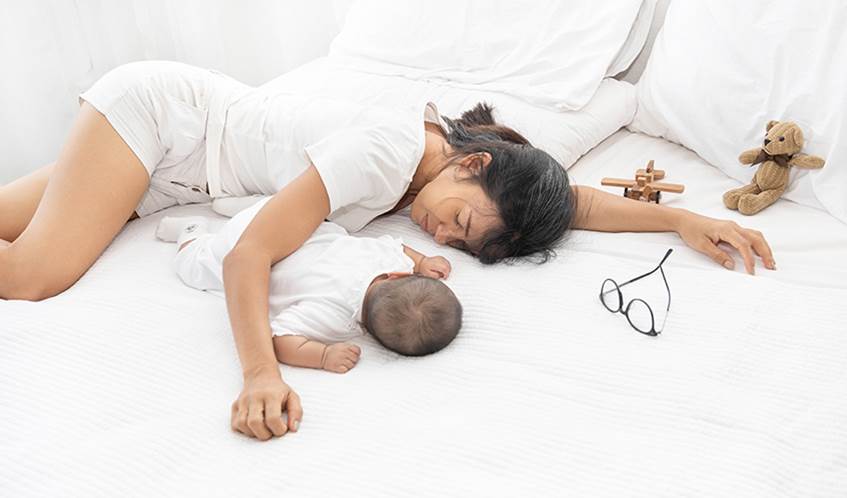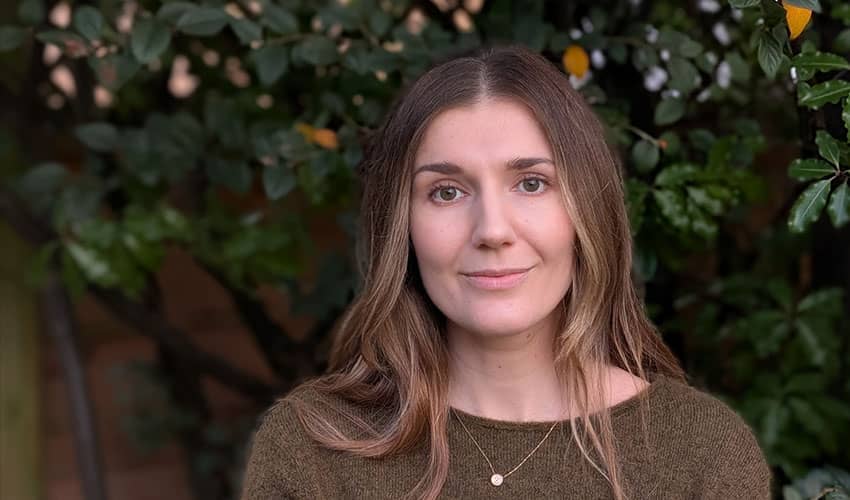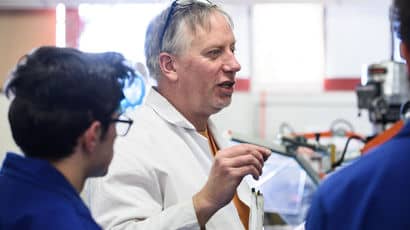The hidden work of new mothers exposed by the COVID-19 pandemic

Research undertaken by academics at UWE Bristol has found that the shutdown of support services and support networks during the COVID-19 pandemic exposed the hidden work that mothers have been performing (and continue to perform) during maternity leave and beyond.
The study, by Dr Jenna Pandeli, Dr Chloe Tarrabain and Dr Mahwish Khan at the university’s Leadership and Change Centre, highlighted how the restrictions imposed significantly limited access to ‘the village’ – the vital networks that new mothers rely on, such as healthcare professionals and childcare groups, friends and family.
They uncovered three invisible issues, which were pushed to an unbearable extreme during this time: physical work, emotional strain, and mental load.
The data suggests that in the face of abandonment by policy makers, limitations on social networks, lack of contact with healthcare professionals and closure of childcare facilities, women plugged the gap themselves, internalising responsibility. The result often being an increase in the physical and emotional work that women were expected to perform throughout the pre-natal to post-natal journey.
Overall, these factors led to intense feelings of anxiety, stress, guilt, and shame for some mothers, with no outlet to get help or support. Balancing the risks posed by the pandemic with their physical, emotional, and mental wellbeing became a complex challenge.
The report calls for a range of improvements to maternal support and healthcare. It makes recommendations to charities, organisations and the government to reinstate ‘the village’, including the introduction of free, universal mother and baby groups, and bringing back baby clinics and support on a more informal basis.
“There needs to be a societal shift in the way mothers are viewed and supported,” says Dr Jenna Pandeli, “not just practically – like universal, free mother and baby groups – but in how mothers are seen. These issues didn’t start with the pandemic, the pandemic simply intensified them, allowing us to see more clearly the additional layers of work mothers are doing during their maternity leave. We intend to continue this research and develop it further.”
The research used a unique method of study called ‘autoethnography’ which incorporates the experiences of the researchers themselves. All three of the academics gave birth during 2020 and, alongside 13 other women, their experiences were collected too.
Dr Chloe Tarrabain commented: “During conversations following our maternity leave, we felt like coming back to work was a ‘holiday’... and that was when we realised that exhausting, all-consuming labour had taken place during our maternity leave.
“We wanted to find out what that labour looks like during maternity leave, and how the pandemic exacerbated this work and brought these issues to light.”
Dr Mahwish Khan added: “There’s an urgent need to move beyond the narratives of ‘ideal worker’ and ‘perfect mother’ that mothers must navigate. We hope our research and suggestions can foster a more inclusive and non-judgemental culture in both our workplaces and broader society.”
Helen Robson, founder of The Bloom Project, added: "The team’s research and final report have uncovered vital lessons that need to be considered by policy makers, employers, and the wider networks who support mothers, parents, and carers. I became a mum during the pandemic, and the report gave me, personally, confidence that I was not alone in how my experience of motherhood was impacted upon. The repercussions of what happened are ongoing and there is still work to be done. An important piece of research with clear messages. The physical work, emotional strain, and mental load continues."
The full report can be viewed on the UWE Bristol website.
Related news

16 February 2026
UWE Bristol researchers awarded grant to explore impact of asset recovery on offenders
UWE Bristol academics have been awarded funding to explore of the impact of asset recovery on deterring offender behaviour and disrupting crime networks.

10 February 2026
Work by UWE Bristol lecturer features in Government’s National Cancer Plan
Work by a UWE Bristol academic has been included in the Government’s National Cancer Plan.

23 January 2026
On-demand minibus services beneficial in rural areas but face financial challenges, trials suggest
Trials of ‘demand responsive transport’ minibus services boosted connectivity for people in rural and suburban areas, according to a new report produced by UWE Bristol researchers.

18 December 2025
UWE Bristol professor appointed National Institute for Health and Care Excellence CEO
Jonathan Benger CBE, Professor of Emergency Care at UWE Bristol, has been appointed as the new chief executive officer of the National Institute for Health and Care Excellence (NICE).

17 December 2025
Findings revealed from first UK study into experiences of mothers who are survivors of rape pregnancy
UWE Bristol academics have revealed the findings of the first UK-based study of the experiences of mothers who are survivors of rape pregnancy.

11 December 2025
Social media influencer work is far more demanding than it looks, research finds
A study exploring the mental health impacts of social media influencer work has revealed that life online is far more demanding than it appears.

25 November 2025
UWE Bristol experts join film Q&A exploring music and melodrama
Academics will take part in the Cary Comes Home Festival, with a post-screening Q&A exploring music, melodrama and emotional storytelling in classic cinema.

17 November 2025
Urgent reform needed to support ambulance-delivered end of life care, study finds
More than three quarters (78 per cent) of paramedics sometimes fear doing the wrong thing when caring for people in the last year of life, new research has found.

13 November 2025
Bristol’s screen industry experiences “boom-and-bust cycle” after post-pandemic recovery, new research from UWE Bristol finds
New research from UWE Bristol provides detailed insight into Bristol's screen sector.

13 November 2025
New AI research to revolutionise animal welfare
A UWE Bristol research project will combine behavioural science and AI to create technology that understands not only what animals do, but how they feel.

10 November 2025
Lessons from Low Traffic Neighbourhoods will drive better public engagement, study finds
Lessons from Low Traffic Neighbourhoods have informed a new toolkit to improve engagement with the public on challenging local street issues.

06 November 2025
First-of-its-kind study aims to help more people spend their final days at home
A new study will explore how architectural design could support end-of-life care in domestic settings.
You may also be interested in

Media enquiries
Enquiries related to news releases and press and contacts for the media team.

Find an expert
Media contacts are invited to check out the vast range of subjects where UWE Bristol can offer up expert commentary.






